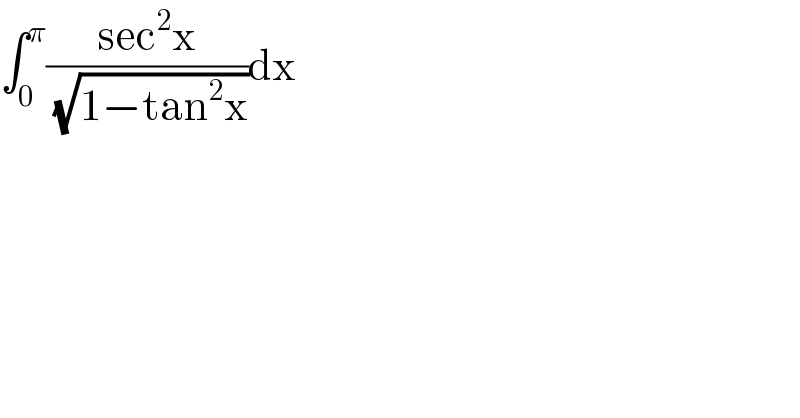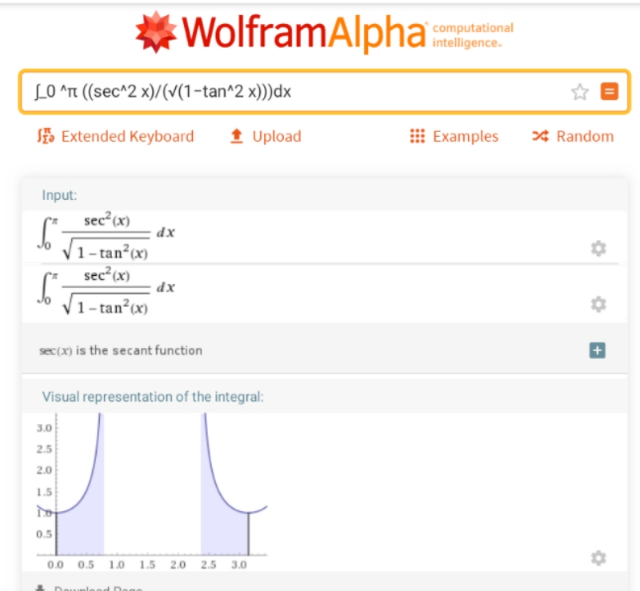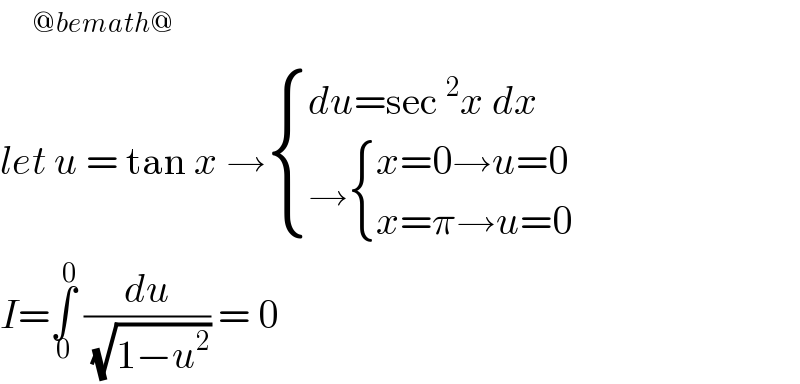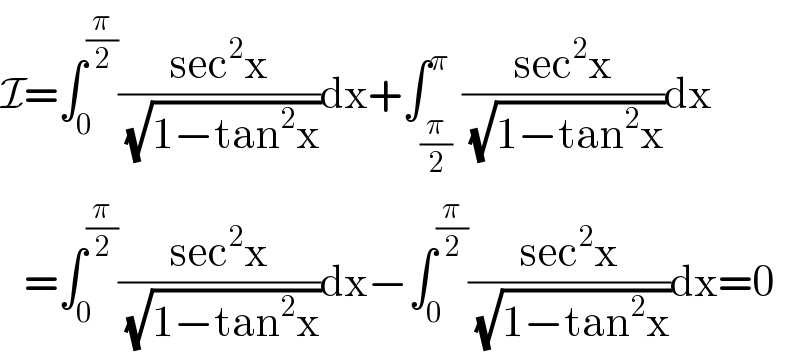
Question Number 106964 by Ar Brandon last updated on 08/Aug/20

$$\int_{\mathrm{0}} ^{\pi} \frac{\mathrm{sec}^{\mathrm{2}} \mathrm{x}}{\sqrt{\mathrm{1}−\mathrm{tan}^{\mathrm{2}} \mathrm{x}}}\mathrm{dx} \\ $$
Commented by Her_Majesty last updated on 08/Aug/20

$${I}\:{believe}\:{this}\:{integral}\:{is}\:{divergent} \\ $$$${must}\:{sleep}\:{now}\:{to}\:{keep}\:{my}\:{majestic}\:{beauty} \\ $$$${will}\:{try}\:{to}\:{show}\:{later} \\ $$
Commented by Dwaipayan Shikari last updated on 08/Aug/20

$$\mathrm{probably} \\ $$
Commented by Dwaipayan Shikari last updated on 08/Aug/20

Commented by Ar Brandon last updated on 08/Aug/20
��Alright her majesty ��
Answered by bemath last updated on 08/Aug/20

$$\:\:\:\:^{@{bemath}@} \\ $$$${let}\:{u}\:=\:\mathrm{tan}\:{x}\:\rightarrow\begin{cases}{{du}=\mathrm{sec}\:^{\mathrm{2}} {x}\:{dx}}\\{\rightarrow\begin{cases}{{x}=\mathrm{0}\rightarrow{u}=\mathrm{0}}\\{{x}=\pi\rightarrow{u}=\mathrm{0}}\end{cases}}\end{cases} \\ $$$${I}=\underset{\mathrm{0}} {\overset{\mathrm{0}} {\int}}\:\frac{{du}}{\sqrt{\mathrm{1}−{u}^{\mathrm{2}} }}\:=\:\mathrm{0} \\ $$
Answered by 1549442205PVT last updated on 08/Aug/20

$$\mathrm{I}=\int_{\mathrm{0}} ^{\:\pi} \frac{\mathrm{d}\left(\mathrm{tanx}\right)}{\sqrt{\mathrm{1}−\mathrm{tan}^{\mathrm{2}} \mathrm{x}}}\underset{\mathrm{tanx}=\mathrm{u}} {=\:}\int_{\mathrm{0}} ^{\:\mathrm{1}} \frac{\mathrm{du}}{\sqrt{\mathrm{1}−\mathrm{u}^{\mathrm{2}} }}=\mathrm{sin}^{−\mathrm{1}} \mathrm{u}\mid_{\mathrm{0}} ^{\mathrm{0}} \\ $$$$=\mathrm{0}−\mathrm{0}=\mathrm{0} \\ $$
Answered by Dwaipayan Shikari last updated on 08/Aug/20
![∫_0 ^π (dt/(√(1−t^2 ))) tanx=t ,sec^2 x=(dt/dx) [sin^(−1) (tanx)]_0 ^π =0](Q106989.png)
$$\int_{\mathrm{0}} ^{\pi} \frac{{dt}}{\sqrt{\mathrm{1}−{t}^{\mathrm{2}} }}\:\:\:\:\:\:\:\:\:\:{tanx}={t}\:\:\:\:\:,{sec}^{\mathrm{2}} {x}=\frac{{dt}}{{dx}} \\ $$$$\left[{sin}^{−\mathrm{1}} \left({tanx}\right)\right]_{\mathrm{0}} ^{\pi} =\mathrm{0} \\ $$
Commented by Ar Brandon last updated on 08/Aug/20

$$\mathrm{Thank}\:\mathrm{y}'\mathrm{all}.\:\mathrm{I}\:\mathrm{really}\:\mathrm{needed}\:\mathrm{to}\:\mathrm{verify}\:\mathrm{something}. \\ $$$$\mathrm{And}\:\mathrm{you}'\mathrm{ve}\:\mathrm{been}\:\mathrm{of}\:\mathrm{great}\:\mathrm{help}. \\ $$
Answered by Ar Brandon last updated on 08/Aug/20

$$\mathcal{I}=\int_{\mathrm{0}} ^{\frac{\pi}{\mathrm{2}}} \frac{\mathrm{sec}^{\mathrm{2}} \mathrm{x}}{\sqrt{\mathrm{1}−\mathrm{tan}^{\mathrm{2}} \mathrm{x}}}\mathrm{dx}+\int_{\frac{\pi}{\mathrm{2}}} ^{\pi} \frac{\mathrm{sec}^{\mathrm{2}} \mathrm{x}}{\sqrt{\mathrm{1}−\mathrm{tan}^{\mathrm{2}} \mathrm{x}}}\mathrm{dx} \\ $$$$\:\:\:=\int_{\mathrm{0}} ^{\frac{\pi}{\mathrm{2}}} \frac{\mathrm{sec}^{\mathrm{2}} \mathrm{x}}{\sqrt{\mathrm{1}−\mathrm{tan}^{\mathrm{2}} \mathrm{x}}}\mathrm{dx}−\int_{\mathrm{0}} ^{\frac{\pi}{\mathrm{2}}} \frac{\mathrm{sec}^{\mathrm{2}} \mathrm{x}}{\sqrt{\mathrm{1}−\mathrm{tan}^{\mathrm{2}} \mathrm{x}}}\mathrm{dx}=\mathrm{0} \\ $$
Answered by Her_Majesty last updated on 08/Aug/20
![y=((sec^2 x)/(√(1−tan^2 x)))=(1/(∣cosx∣(√(cos2x)))) for 0≤x≤π y is defined for 0≤x<(π/4) and ((3π)/4)<y≤π ⇒ the integral only exists if the imaginary/complex parts cancel out but let′s try ∫_0 ^π (dx/(∣cosx∣(√(cos2x))))=2∫_0 ^(π/2) (dx/(cosx(√(cos2x)))) with t=tanx we get ∫_0 ^(π/2) (dx/(cosx(√(cos2x))))=∫_0 ^(+∞) (dt/(√(1−t^2 )))=[arcsin(t)]_0 ^(+∞) = =lim_(t→+∞) arcsin(t) which is (π/2)−i∞ (try some values like t=10^(10) , 10^(20) ... ⇒ the integral is divergent](Q107087.png)
$${y}=\frac{{sec}^{\mathrm{2}} {x}}{\sqrt{\mathrm{1}−{tan}^{\mathrm{2}} {x}}}=\frac{\mathrm{1}}{\mid{cosx}\mid\sqrt{{cos}\mathrm{2}{x}}} \\ $$$${for}\:\mathrm{0}\leqslant{x}\leqslant\pi\:\:{y}\:{is}\:{defined}\:{for}\:\mathrm{0}\leqslant{x}<\frac{\pi}{\mathrm{4}}\:{and} \\ $$$$\frac{\mathrm{3}\pi}{\mathrm{4}}<{y}\leqslant\pi\:\:\Rightarrow\:{the}\:{integral}\:{only}\:{exists}\:{if}\:{the} \\ $$$${imaginary}/{complex}\:{parts}\:{cancel}\:{out} \\ $$$${but}\:{let}'{s}\:{try} \\ $$$$\underset{\mathrm{0}} {\overset{\pi} {\int}}\frac{{dx}}{\mid{cosx}\mid\sqrt{{cos}\mathrm{2}{x}}}=\mathrm{2}\underset{\mathrm{0}} {\overset{\pi/\mathrm{2}} {\int}}\frac{{dx}}{{cosx}\sqrt{{cos}\mathrm{2}{x}}} \\ $$$${with}\:{t}={tanx}\:{we}\:{get} \\ $$$$\underset{\mathrm{0}} {\overset{\pi/\mathrm{2}} {\int}}\frac{{dx}}{{cosx}\sqrt{{cos}\mathrm{2}{x}}}=\underset{\mathrm{0}} {\overset{+\infty} {\int}}\frac{{dt}}{\sqrt{\mathrm{1}−{t}^{\mathrm{2}} }}=\left[{arcsin}\left({t}\right)\right]_{\mathrm{0}} ^{+\infty} = \\ $$$$=\underset{{t}\rightarrow+\infty} {{lim}arcsin}\left({t}\right)\:{which}\:{is}\:\frac{\pi}{\mathrm{2}}−{i}\infty\:\left({try}\:{some}\right. \\ $$$${values}\:{like}\:{t}=\mathrm{10}^{\mathrm{10}} ,\:\mathrm{10}^{\mathrm{20}} ... \\ $$$$\Rightarrow\:{the}\:{integral}\:{is}\:{divergent} \\ $$
Commented by Ar Brandon last updated on 08/Aug/20
OK Sir, thanks
